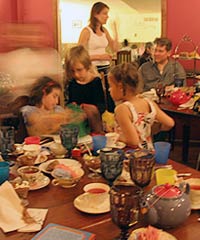

The change of seasons is a marvelous thing.
I think it was CS Lewis who noted that humans inhabit time with both a linear and cyclical experience. We grow up and get old, but each year brings a rhythm of the seasons and, in my experience along with Lewis, the cycle of the church year. Now we are in Epiphany, and on Sunday I will be preaching on Matthew 2, when the magi came to Bethlehem to pay homage to the newborn king.
(Theological aside: the seasons seem to me to be part of the Creator's goodness to us, and I wonder if the new creation will have them.)
As someone resident in the Northern Hemisphere, Epiphany is also tied up with winter and snow in my mind. And that of Number One Son as well, who was answering a number of Brain Teaser questions on the car ride home from Canada on New Year's Day. He got almost all of the questions right (for the grade ahead, his proud father noted to himself), but answered the question, "what are the four seasons?" with "Spring, Summer, Fall and Snow".
He could be forgiven for mixing up snow and winter, as we were visiting our family in a remote section of Ontario, where it was minus five degrees (Fahrenheit) on our departure, with snow and ice abounding. The ice was thick on the lake, where Number One Son had skated for the first time, and where a couple of wolves were spotted the previous morning. And as we drove away, I encouraged to the children to look over the lake realizing we might next see it in the summer when the colors will be blue and green, rather than white and gray it was in its frozen state. We drove down the driveway talking about how all the colors would change, and the things we looked forward to in the summer. One of those was picking raspberries and making them into jam. I sat around too much this vacation, except when clearing some trees that were felled in a storm, and so hope for a more active visit come summer.
But staying with Richard Wilbur for awhile longer, here is a poem that was published in the New Yorker five years ago that pretty much captures the children's hopes for the summer when we return to visit grandparents. We had wild raspberry jam from last summer on toast this morning, as there was not yet any milk or eggs for breakfast, having returned late last night from the five hundred mile drive...
Blackberries for Amelia
By Richard Wilbur
Fringing the woods, the stone walls, and the lanes,
Old thickets everywhere have come alive,
Their new leaves reaching out in fans of five
From tangles overarched by this year's canes.
They have their flowers, too, it being June,
And here or there in brambled dark-and-light
Are small, five-petalled blooms of chalky white,
As random-clustered and as loosely strewn
As the far stars, of which we are now told
That ever faster do they bolt away,
And that a night may come in which, some say,
We shall have only blackness to behold.
I have no time for any change so great,
But I shall see the August weather spur
Berries to ripen where the flowers were --
Dark berries, savage-sweet and worth the wait --
And there will come the moment to be quick
And save some from the birds,and I shall need
Two pails, old clothes in which to stain and bleed,
And a grandchild to talk with while we pick.
Originally published in the New Yorker, July 7, 2003
But maybe we'll go back in the spring to make maple syrup...















